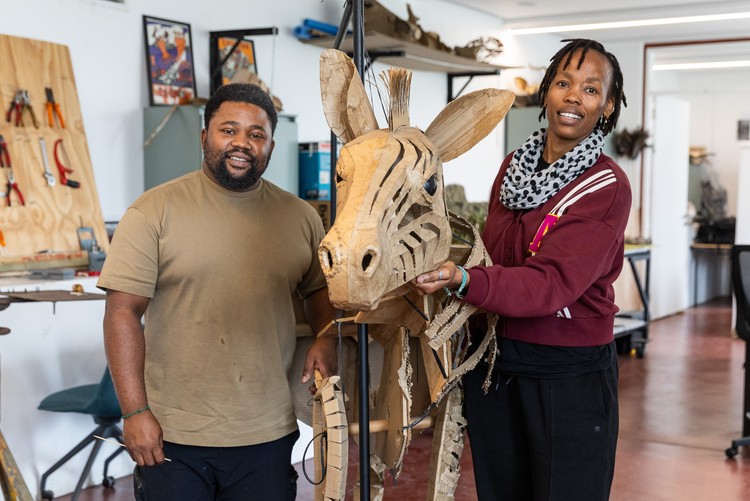
10 October 2025
Sipho Ngxola and Siphokazi Mpofu of the Ukwanda Puppetry and Design Art Collective. Photo: Ashraf Hendricks
The Herds, an ambitious public arts project featuring hundreds of life-sized animal puppets, has completed a journey from Kinshasa in the Democratic Republic of Congo to Nordkapp, Norway, in the Arctic Circle.
The project was created to raise awareness about climate change and migration. It brought to life a moving parade of gorillas, monkeys, zebras and other animals. All the puppets were designed and built by Cape Town’s Ukwanda Puppetry and Design Art Collective.
The arts project was produced by The Walk Productions, directed by Amir Nizar Zuabi, and supported by the Centre for Humanities Research at the University of the Western Cape. Ukwanda was founded in 2019 under the mentorship of Handspring Puppet Company.
For puppet designer Sipho Ngxola, one of the puppeteers behind The Herds, a highlight was meeting King Charles in London while operating the gorilla puppet. “It was a big thing for the project,” he said.
Ngxola added that the king was intrigued by the puppet’s materials and even broke royal protocol by returning the gorilla’s handshake. “They said I must lift the hand and see if the king is going to lift his hand, and he did,” Ngxola said.
King Charles meets the Herds at Lancaster House in London on 24 June 2025. Photo: Jaber Ahmed (DEFRA, copyright reserved by the photographer)
The Herds held 56 public performances in 11 countries, training over 1,000 people as puppeteers and building more than 300 puppets. More than 350 artists and musicians were involved in the project. Performances included blended puppetry, music and dance. They performed in glaciers, forests, shopping malls and parks. The final performance, in August, was in Nordkapp inside the Arctic Circle.
The Ukwanda Puppetry team began designing the puppets in January 2024. Ngxola said the project was one of the most challenging they had undertaken, as they were instructed to work only with cardboard and other simple materials. “Cardboard was a big challenge at the beginning, but we conquered it,” he said.
Throughout the journey, the team doubled as teachers and technicians, training new puppeteers in each city. “We had to fix puppets daily and perform at the same time,” said puppetry designer Siphokazi Mpofu. Normally it takes weeks to train someone, but during the tour it had to be done in three or four days. “The challenges and the toughness of it also gave us the growth,” she said.
Siphokazi Mpofu of the Ukwanda Puppetry and Design Art Collective in Marrakesh, Morocco. Photo: Oussama Oulhiq (Copyright reserved by the photographer)
Mpofu recalled how audiences were often moved to tears. “It’s how puppets can tell the sensitive stories that humans, as performers, cannot,” she said. Mpofu said audiences were aware that the animals had walked (metaphorically) from Africa to Europe, and saw how worn the puppets’ skin had become.
For her, the migrating animals also symbolised human migration. “It’s also about people who are also migrating from their homes, going around the world looking for a better life,” she said.
Since returning home, the Ukwanda Puppetry team has received growing interest from groups eager to host The Herds.